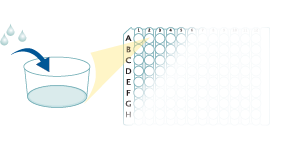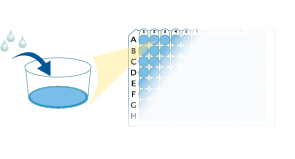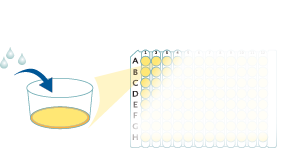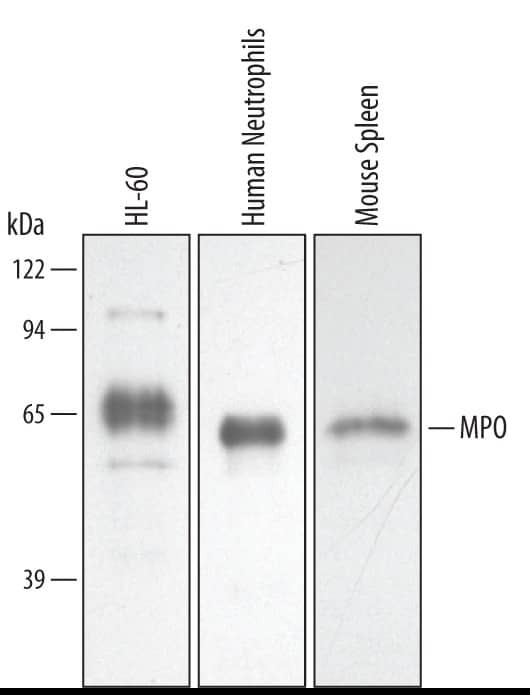Mouse Dkk-1 Quantikine ELISA Kit Summary
Customers also Viewed
Product Summary
Precision
Cell Culture Supernates, Serum, EDTA Plasma, Heparin Plasma
| Intra-Assay Precision | Inter-Assay Precision | |||||
|---|---|---|---|---|---|---|
| Sample | 1 | 2 | 3 | 1 | 2 | 3 |
| n | 20 | 20 | 20 | 40 | 40 | 40 |
| Mean (pg/mL) | 230 | 478 | 1487 | 219 | 481 | 1492 |
| Standard Deviation | 20.1 | 29.7 | 80.8 | 20.8 | 44.7 | 144 |
| CV% | 8.7 | 6.2 | 5.4 | 9.5 | 9.3 | 9.7 |
Recovery
The recovery of mouse Dkk-1 spiked to three levels throughout the range of the assay was evaluated.
| Sample Type | Average % Recovery | Range % |
|---|---|---|
| Cell Culture Supernates (n=4) | 99 | 88-107 |
| EDTA Plasma (n=4) | 109 | 93-117 |
| Heparin Plasma (n=4) | 113 | 104-119 |
| Serum (n=4) | 113 | 100-120 |
Linearity
Scientific Data
Product Datasheets
Preparation and Storage
Background: Dkk-1
Members of the dickkopf-related protein family (Dkk-1, -2, -3, and -4) are secreted proteins with two cysteine-rich domains separated by a linker region. Dkk-3 and -4 also have one prokineticin domain. Dkk-1, -2, and -4 function as antagonists of canonical Wnt signaling by binding to LRP5/6, preventing interaction of LRP5/6 with Wnt-Frizzled complexes. Dkk-1, -2, and -4 also bind cell surface Kremen-1 or -2 and promote the internalization of LRP5/6. Antagonistic activity of Dkk-3 has not been demonstrated. Dkk proteins have distinct patterns of expression in adult and embryonic tissues and have a wide range of effects on tissue development and morphogenesis. The Dkk family also includes Soggy, which is homologous to Dkk-3 but not to the other family members. Soggy has not been shown to inhibit Wnt signaling, and its role in the pathway is unclear.
Assay Procedure
Refer to the product- Prepare all reagents, standard dilutions, and samples as directed in the product insert.
- Remove excess microplate strips from the plate frame, return them to the foil pouch containing the desiccant pack, and reseal.
- Add 50 µL of Assay Diluent to each well.
- Add 50 µL of Standard, Control, or sample to each well. Cover with a plate sealer, and incubate at room temperature for 2 hours.
- Aspirate each well and wash, repeating the process 4 times for a total of 5 washes.
- Add 100 µL of Conjugate to each well. Cover with a new plate sealer, and incubate at room temperature for 2 hours.
- Aspirate and wash 5 times.
- Add 100 µL Substrate Solution to each well. Incubate at room temperature for 30 minutes. PROTECT FROM LIGHT.
- Add 100 µL of Stop Solution to each well. Read at 450 nm within 30 minutes. Set wavelength correction to 540 nm or 570 nm.





Citations for Mouse Dkk-1 Quantikine ELISA Kit
R&D Systems personnel manually curate a database that contains references using R&D Systems products. The data collected includes not only links to publications in PubMed, but also provides information about sample types, species, and experimental conditions.
6
Citations: Showing 1 - 6
Filter your results:
Filter by:
-
Dickkopf-1 Acts as a Profibrotic Mediator in Progressive Chronic Kidney Disease
Authors: YC Hsu, CC Chang, CC Hsieh, YT Huang, YH Shih, HC Chang, PJ Chang, CL Lin
International Journal of Molecular Sciences, 2023-04-21;24(8):.
Species: Rat
Sample Types: Serum
-
Canonical Wnt signaling promotes pacemaker cell specification of cardiac mesodermal cells derived from mouse and human embryonic stem cells
Authors: W Liang, P Han, EH Kim, J Mak, R Zhang, AG Torrente, JI Goldhaber, E Marbán, HC Cho
Stem Cells, 2019-12-30;0(0):.
Species: Mouse
Sample Types: Cell Culture Supernates
-
Dickkopf-1 promotes hematopoietic regeneration via direct and niche-mediated mechanisms
Nat. Med, 2016-12-05;0(0):.
Species: Mouse
Sample Types: Cell Culture Supernates
-
Leukocyte Beta-Catenin Expression Is Disturbed in Systemic Lupus Erythematosus
PLoS ONE, 2016-08-22;11(8):e0161682.
Species: Mouse
Sample Types: Serum
-
Bone marrow stromal cells create a permissive microenvironment for myeloma development: a new stromal role for Wnt inhibitor Dkk1.
Authors: Fowler J, Mundy G, Lwin S, Edwards C
Cancer Res, 2012-02-28;72(9):2183-9.
Species: Mouse
Sample Types: Serum
-
Prostaglandin E(2) Signals Through PTGER2 to Regulate Sclerostin Expression.
Authors: Genetos DC, Yellowley CE, Loots GG
PLoS ONE, 2011-03-16;6(3):e17772.
Species: Mouse
Sample Types: Cell Lysates
FAQs
No product specific FAQs exist for this product, however you may
View all ELISA FAQsSupplemental ELISA Products
Reviews for Mouse Dkk-1 Quantikine ELISA Kit
Average Rating: 5 (Based on 1 Review)
Have you used Mouse Dkk-1 Quantikine ELISA Kit?
Submit a review and receive an Amazon gift card.
$25/€18/£15/$25CAN/¥75 Yuan/¥2500 Yen for a review with an image
$10/€7/£6/$10 CAD/¥70 Yuan/¥1110 Yen for a review without an image
Filter by:

















